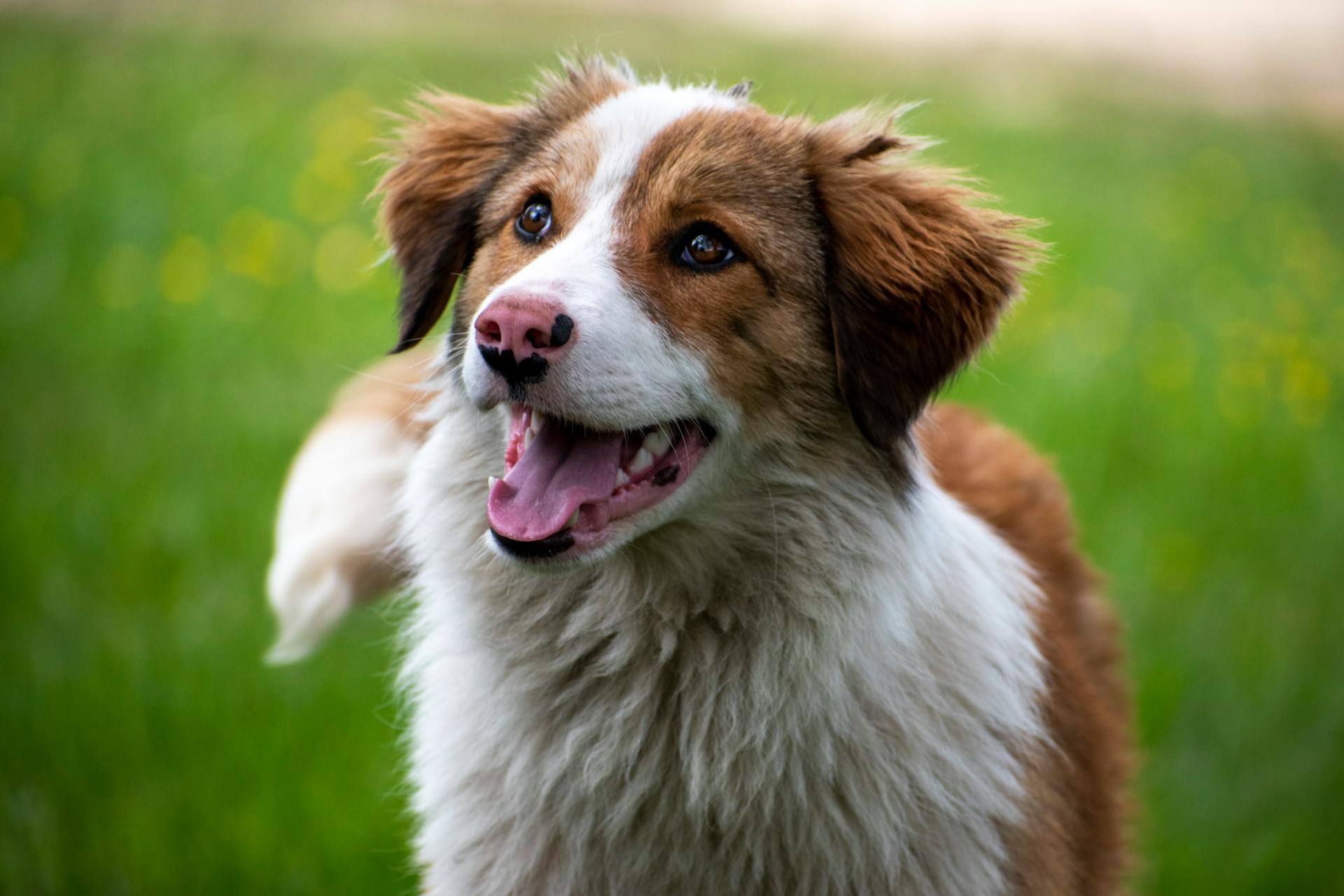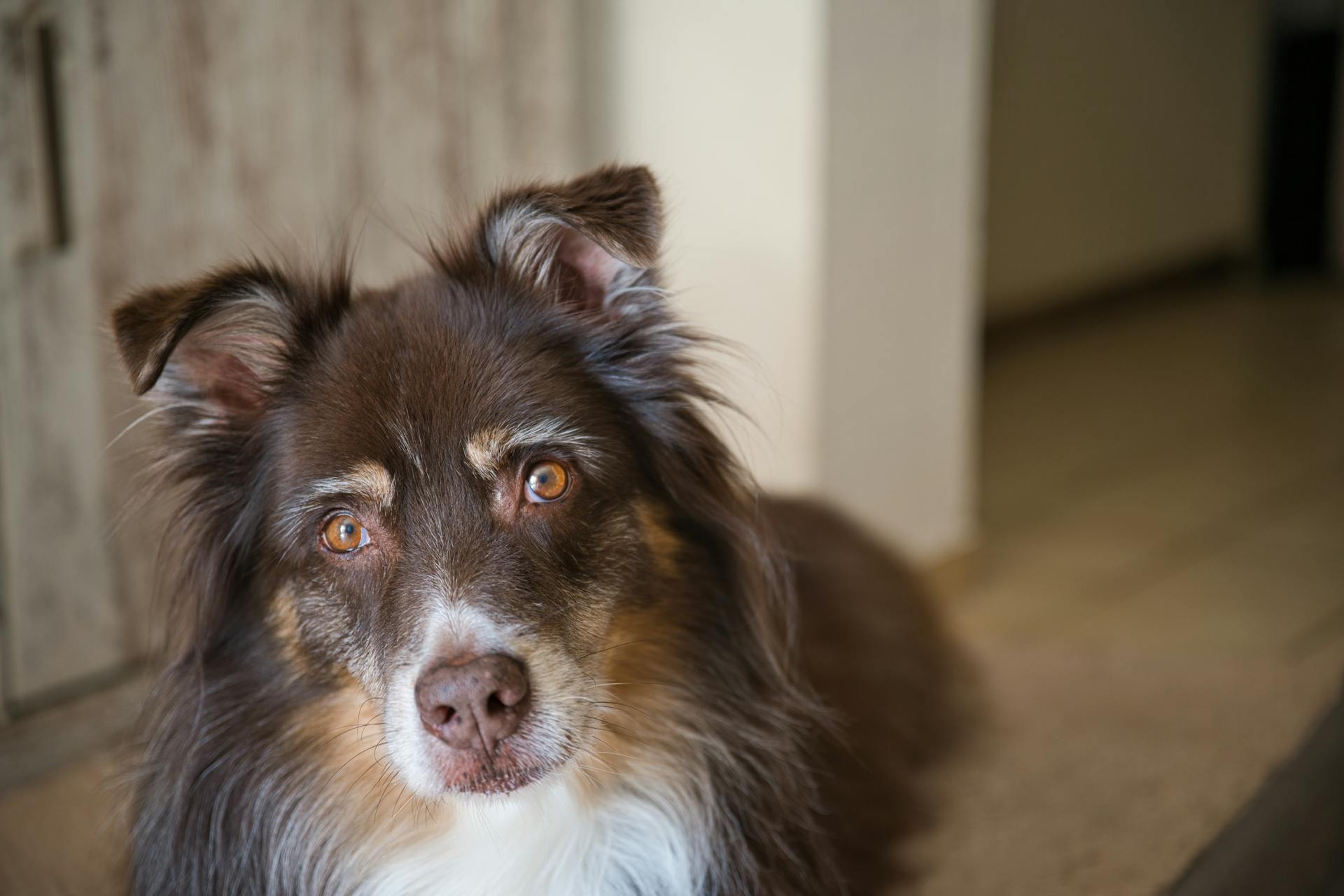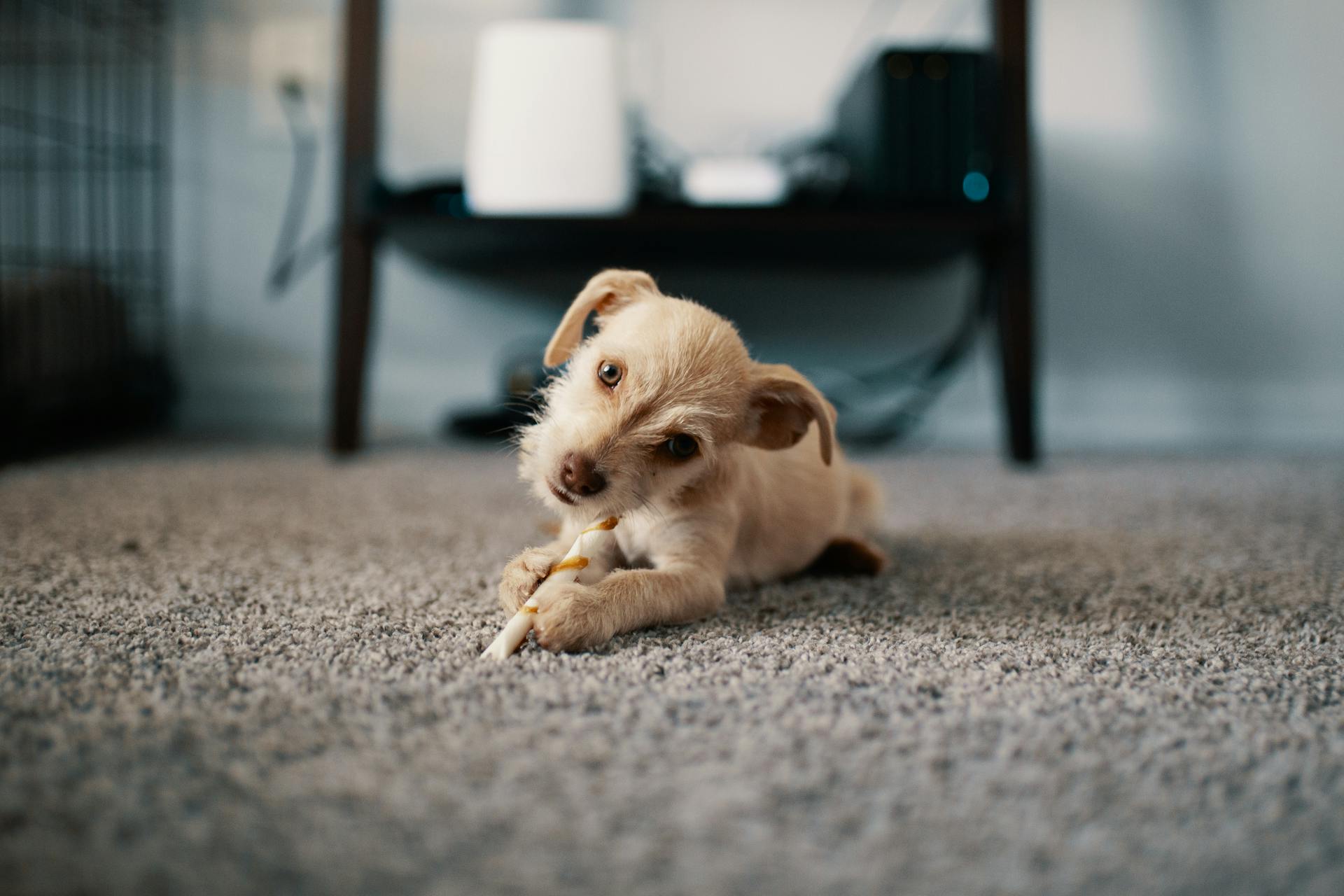
Jackadoodle puppies are a cross between a Jack Russell Terrier and a Poodle, resulting in a unique and adorable breed. They're known for their intelligence, energy, and low-shedding coat.
Jackadoodles are generally small to medium-sized dogs, weighing between 10-20 pounds and standing about 10-15 inches tall. This makes them a great choice for apartment living or for families with smaller children.
They're also highly trainable, thanks to their Jack Russell Terrier heritage. With consistent training and positive reinforcement, Jackadoodles can learn a wide range of commands and behaviors.
Jack-a-Poo Temperament & Intelligence
Jack-a-Poos are highly intelligent dogs, making them amazing pets for active families. They love playing outdoors and need frequent exercise to stay happy and healthy.
These dogs are not aggressive, but they can be stubborn at times. Consistent, positive reinforcement-based training is essential from the beginning to avoid frustrating behaviors.
Jack-a-Poos are natural-born players and love having kids around. In fact, they'll think they've died and gone to heaven if they're put in a backyard with a couple of kids!
With patience and perseverance, you can train a Jack-a-Poo to be a well-behaved and loving companion.
Pet Compatibility
Jackadoodle puppies are known for their friendliness, which makes them a great addition to many families. They get along well with other dogs, and with proper introduction, they can even live with cats.
However, caution is advised if you have small pets like hamsters or rats, as a Jackadoodle may see them as prey. The same goes for birds - they need to learn that birds are not something to chase and kill.
Introducing a new dog to a Jackadoodle can be challenging, as they may become jealous. But over time, they'll likely realize the new dog is not a threat, and the two can live together without issues.
Jackadoodles are generally friendly to people and other pets, making them a great fit for families with multiple pets.
See what others are reading: Training Puppies Not to Bite
Owning a Jackapoo
Owning a Jackapoo can be a wonderful experience, but it's essential to understand their unique characteristics.
Before bringing a Jackapoo home, know that they're a cross between a Jack Russell Terrier and a Toy or Miniature Poodle.
They were bred as pets to combine the best traits of both parent breeds, which is a great thing!
Jackapoos are often described as 'designer dogs' due to their intentional breeding.
To make your life easier, it's helpful to remember that Jackapoos originated in the USA in the 1990s.
Training
Training your Jackadoodle puppy is a breeze if they take after their Miniature Poodle parent, as they are highly trainable and obedient.
Miniature Poodles are known for being easy to train, and their influence will shine through in your Jackadoodle.
A Jackadoodle learns quickly and is eager to please, making them thrive on positive reinforcement.
Plan on giving your dog lots of praise and the occasional treat during training sessions.
If your Jackadoodle starts showing their stubborn side, ignore them and wait it out - they'll quickly realize they only get attention when listening well.
This approach is especially effective with Jack Russells, which can be rather stubborn at times.
A unique perspective: Small Dogs Beagle
Jackapoo Grooming Needs
Jackapoos have fairly low-shedding coats, so you won't find too many dust bunnies all over your house.
Regular brushing is a must, with a minimum of 2-3 times a week to prevent matting and tangling. Brushing every part of their body, including the tail, is also essential.
You should only bathe a Jackapoo when they're very dirty, as over-bathing can lead to dry, irritated skin.
Plan on brushing your Jackapoo's teeth every day, or at least twice a day, to keep their chompers clean and healthy.
Jackapoos may need professional grooming every few months if they inherit the Poodle-like coat.
Nail trimming is essential every couple of weeks to prevent overgrowth. If you're not comfortable trimming your Jackapoo's nails yourself, find a groomer who will do the job for you or speak to your vet.
Health and Care
Jackadoodle puppies are generally pretty healthy, but like all breeds, they can be prone to certain health issues. A mixed breed like the Jackadoodle can "breed out" some of the prominent maladies in purebred lines, but they can still inherit health issues from their parent breeds.
Some common health issues that can affect Jackadoodles include epilepsy, hypothyroidism, and Addison's disease. They can also be prone to eye issues, patellar luxation, and hip dysplasia.
A healthy diet and regular exercise can go a long way in optimizing your Jackadoodle's health. And, just like with humans, while you can't always avoid your own genetics, you can take steps to ensure your dog lives a long and happy life.
The average lifespan of a Jackadoodle is 12-15 years, which is a decent amount of time to enjoy the companionship of your furry friend.
Here are some common health concerns that can affect Jackadoodles:
- Epilepsy
- Hypothyroidism
- Addison's disease
- Cushing's disease
- Von Willebrand's disease
- Eye issues
- Patellar luxation
- Hip dysplasia
- Bloat
- Skin disorders
In terms of grooming, Jackadoodles can have a range of coat types, from wiry to curly. They don't require a lot of grooming, but regular brushing and washing can help keep them clean. If your Jackadoodle has a finer, curlier coat, they may need regular groomer visits.
Like any dog, regular tooth brushing with a dog-specific toothpaste is essential to keep their teeth healthy.
Exercise and Size
Jackadoodle puppies need regular exercise to maintain a healthy weight and size.
A daily walk of 30 minutes to an hour is ideal for young puppies.
As they grow, they'll need more physical activity to burn off excess energy.
Jackadoodles are prone to obesity if they don't get enough exercise, so it's essential to establish a routine early on.
Exercise Needs

Exercise needs vary depending on your age and health status. If you're over 65, you should aim for at least 150 minutes of moderate-intensity exercise or 75 minutes of vigorous-intensity exercise per week.
As you get older, your muscle mass and bone density decrease, making it essential to incorporate strength training into your routine. Research suggests that resistance exercises can help maintain muscle mass and bone density in older adults.
For people with pre-existing health conditions, it's crucial to consult with a doctor before starting any new exercise program. This is especially important for those with heart conditions, as high-intensity exercise can be detrimental to their health.
In terms of frequency, it's recommended to exercise at least 3-4 times per week, with at least one day of rest in between. This allows your muscles time to recover and rebuild.
Jack-a-Poo Size
Jack-a-Poos can range from small-to-medium in size, depending on how large their parents are, and especially if the Poodle is Toy versus Miniature.
They typically weigh between 13 and 25 pounds.
Their height is usually between 10 to 16 inches tall.
There's no significant difference in size between males and females.
History and Origins
The Jack-A-Poo's history is a bit of a mystery, but it's clear they emerged as part of the 1980s trend of creating Poodle mixes.
The Poodle is one of the oldest breeds in the world, originating in Germany as waterfowl retrievers and later becoming the breed we know in France.
The Jack Russell Terrier, on the other hand, was developed in the early 1800s in England, combining the hunting and tracking abilities of the Terrier with the nimbleness of its small size.
These "designer dogs" are still in high demand, and unfortunately, not everyone who brings home a Jack-A-Poo ends up keeping them, making adoption a great option.
Discover more: English Springer Poodle Mix
Jack-a-Poo History
The Jack-A-Poo's history is a bit of a mystery, but it's clear they emerged in the 1980s as part of a trend to create Poodle mixes in the USA.
The Poodle is an ancient breed that originated in Germany as waterfowl retrievers and later became the breed we know and love today in France.
Suggestion: Big Dog Poodle Mixes
The Jack Russell Terrier, on the other hand, was developed in the early 1800s with a focus on natural hunting and tracking abilities, as well as the nimbleness of its small size.
This intentional mix of breeds is often referred to as a "designer dog", and they're still in high demand today.
Not everyone who brings home a Jack-A-Poo ends up keeping them, unfortunately, which means they're also available to adopt from shelters.
Dogs by Many Names
The Jack a Poo is also known as the Jackadoodle, a name that's often used interchangeably with the breed.
Knowing all the names of a breed is crucial when searching for a breeder online, as it ensures you find all available puppies.
Some people refer to the Jack a Poo as a Jack a Poodle, while others call it a Poojack.
Jack-A-Poo Coat Color and Grooming
The Jack-A-Poo coat is a unique blend of its Poodle and Jack Russell Terrier parents.
Their coats can be straight, short, coarse, curly, or fluffy, and come in a variety of colors including white, black, brown, tan, gray, and blue.
One thing you can count on is their noses are always black, and their eyes are always brown.
Grooming is relatively low-maintenance, requiring only a weekly brushing and baths as needed.
You might also consider professional grooming every so often to keep your Jack-A-Poo looking its best.
Their tolerance to hot and cold weather depends on which parent's coat they inherit, but in general, they're pretty adaptable to both heat and cold.
Just be sure to watch for heavy panting as a sign of dehydration or heat stroke, especially on hot days.
In cold weather, a coat or sweater can be a great help for your Jack-A-Poo, especially if it's small.
Food and Nutrition
When choosing the right food for your Jackadoodle puppy, it's essential to feed them the same food they were eating at the breeder to avoid gastric upsets.
If this caught your attention, see: Puppys Food
Puppies need a lot of energy to run, play, and grow, so they require at least 4 meals a day. This is especially true for Jackadoodle puppies, who can burn a lot of energy.
A strict feeding and potty schedule is crucial for your puppy's development, so be sure to establish one and follow it.
Small dog breeds like Jackapoos only need around 296 calories per day, so be mindful of your puppy's portion sizes to prevent obesity.
Some Jackadoodles are sensitive to certain ingredients, such as wheat, corn, soy, and dairy, as well as specific proteins like chicken, fish, peas, and pork. If your puppy shows signs of sensitivity, consider a special diet or vet-prescribed diet.
To keep your Jackadoodle healthy and happy, avoid foods containing GMO ingredients, preservatives, meat byproducts, fillers, and artificial colors and flavors.
A raw dog food diet of red meat or lamb with vegetables and meaty bones is often a good choice for Jackapoos, but be sure to consult with a vet before making any significant changes to your puppy's diet.
Here are some key tips to keep in mind when feeding your Jackadoodle:
- Feed your puppy the same food they were eating at the breeder.
- Puppies need at least 4 meals a day, while adult Jackapoos can get by with 2 meals a day.
- Establish a strict feeding and potty schedule.
- Avoid foods with GMO ingredients, preservatives, and other unhealthy additives.
- Consider a raw dog food diet or special diet if your puppy shows signs of sensitivity.
Frequently Asked Questions
What is the difference between a Jackapoo and a Jackadoodle dog?
There is no difference between a Jackapoo and a Jackadoodle, as both terms refer to the same crossbreed between a Jack Russell terrier and a toy or miniature poodle. Both names describe a unique and lovable hybrid dog.
Sources
- https://www.dogster.com/dog-breeds/jack-a-poo
- https://dogtime.com/dog-breeds/jack-a-poo
- https://www.borrowmydoggy.com/doggypedia/dog-breed-guides-jackapoo
- https://raggydogs.com.au/blog/%EF%BF%BCjack-a-poo-complete-guide-to-the-jack-russell-terrier-poodle-mix-breed/
- https://www.dogbreedinfo.com/jackapoo.htm
Featured Images: pexels.com


